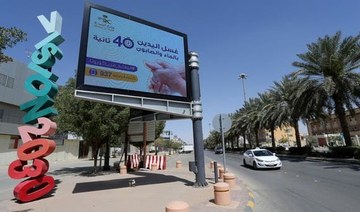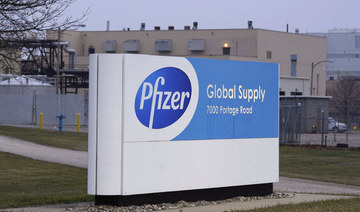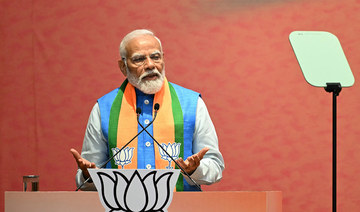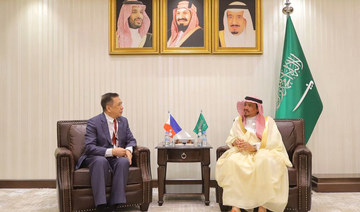WASHINGTON: With some Americans now paying the price for what they did over Thanksgiving and falling sick with COVID-19, health officials are warning people — begging them, even — not to make the same mistake during the Christmas and New Year’s season.
“It’s a surge above the existing surge,” said Ali Mokdad, a professor of health metrics sciences at the University of Washington in Seattle. “Quite honestly, it’s a warning sign for all of us.”
Across the country, contact tracers and emergency room doctors are hearing repeatedly from new coronavirus patients that they socialized over Thanksgiving with people outside their households, despite emphatic public-health warnings to stay home and keep their distance from others.
The virus was raging across the nation even before Thanksgiving but was showing some signs of flattening out. It has picked up steam since, with new cases per day regularly climbing well over 200,000.
The dire outlook comes as the US stands on the brink of a major vaccination campaign against COVID-19, with the Food and Drug Administration giving the final go-ahead Friday to use Pfizer’s formula against the scourge that has killed over 290,000 Americans and infected more than 15.8 million.
White House chief of staff Mark Meadows had pressed FDA chief Stephen Hahn to grant authorization by the end of the day or face possible firing, according to two administration officials speaking on condition of anonymity.
President Donald Trump, who has been fuming at the FDA for not moving faster on the vaccine, called the agency a “big, old, slow turtle” on Twitter, adding: “Get the dam vaccines out NOW, Dr. Hahn. Stop playing games and start saving lives.”
Hahn has said he would be guided by “science, not politics.”
COVID-19 deaths in the US have climbed to a seven-day average of almost 2,260 per day, about equal to the peak seen in mid-April, when the New York City area was under siege. New cases are running at about 195,000 a day, based on a two-week rolling average, a 16% increase from the day before Thanksgiving, according to an Associated Press analysis.
In Washington state, contact tracers counted at least 336 people testing positive who said they attended gatherings or traveled during the Thanksgiving weekend. More are expected.
The virus could still be incubating in someone who was exposed while traveling home the Sunday after Thanksgiving; the end of that two-week incubation period is this Sunday.
Zana Cooper, a 60-year-old cancer survivor in Murrieta, California, tested positive for COVID-19 after attending a Thanksgiving dinner with her son’s girlfriend’s family. At the dinner, the girlfriend’s father, who had recently traveled to Florida, wasn’t feeling well and went to bed early.
Cooper learned the following Sunday that he tested positive.
“My first reaction was the f-word. I was so mad,” she said. “I was upset. I was angry. I was like, ‘How dare you take my life in your hands?’”
She has had fever and headaches, a runny nose and bloodshot eyes, and in recent days it has become more difficult to breathe and she has been using an inhaler. She said she believes she brought the virus home to her daughter and two grandchildren, who live with her and are now ill with what a doctor diagnosed as COVID-19.
In Philadelphia, a woman in her 20s gathered with 10 relatives on Thanksgiving, though she didn’t feel well the day before. She later tested positive for COVID-19. Her family started developing symptoms, and seven members tested positive, said Dr. Thomas Farley, Philadelphia’s health commissioner.
The next round of festivities could yield even more cases. Wall-to-wall holidays started this week. Hanukkah began Thursday evening and ends Dec. 18, followed by Christmas, Kwanzaa and New Year’s Eve.
“This is not the time to invite the neighbors over for dinner. This is not the time to start having parties,” said Dr. Joshua LaBaer, an Arizona State University researcher.
In parts of New York state, contact tracers are regularly hearing from the newly infected that they attended Thanksgiving festivities, said Steuben County Public Health Director Darlene Smith. Still unknown is how many they will infect and how many eventually will need a bed in intensive care, she said.
“It’s the domino effect,” Smith said.
Harry and Ashley Neidig, of Shepherdstown, West Virginia, tested positive for COVID-19 last week. They said they believe they contracted it from someone at their jobs as security officers but didn’t know of their possible exposure before they celebrated Thanksgiving with both sides of the family.
On the Tuesday after Thanksgiving, Ashley Neidig, 25, noticed she couldn’t smell a menthol-scented body scrub. After the couple got tested, they contacted their families to warn them. Some were awaiting test results, and so far no one else has had any symptoms, said Harry Neidig, 24.
“We feel bad because … we definitely should’ve put a heavier weight into our decision to go,” he said. “We should have told our family, ‘Hey, given the nature of our job, we can’t quarantine like other people in an office job.’“
He added: “You might want to take another look before you go somewhere for Christmas.”
The surge around the country has swamped hospitals and left nurses and other health care workers exhausted and demoralized.
“Compassion fatigue is the best word for what we’re experiencing,” said Kiersten Henry, an ICU nurse practitioner at MedStar Montgomery Medical Center in Olney, Maryland. “I feel we’ve already run a marathon, and this is our second one. Even people who are upbeat are feeling run down at this point.”
While some hospitals are scrambling to find beds and convert storage rooms and other places for use in treating patients, they are also dealing with dire staff shortages.
“We know how to make new beds,” said Dr. Lew Kaplan, a critical care surgeon at the University of Pennsylvania’s Perelman School of Medicine. “We don’t know how to make new staff.”
Viral spread: Americans paying the price for Thanksgiving
https://arab.news/rsnej
Viral spread: Americans paying the price for Thanksgiving
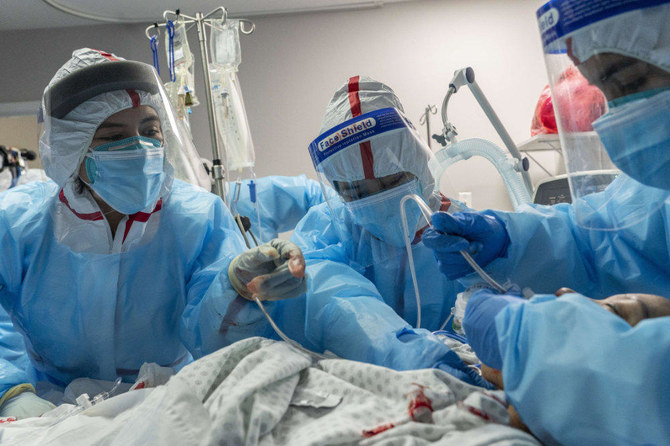
- Contact tracers in In Washington state counted at least 336 people testing positive who said they attended gatherings or traveled during the Thanksgiving weekend
- Zana Cooper of Murrieta, California, tested positive for COVID-19 after attending a Thanksgiving dinner with her son’s girlfriend’s family
Police aim to break up pro-Palestine protests in Amsterdam

- The Eindhoven University of Technology confirmed that there were “dozens of students peacefully protesting outside next to ten to 15 tents”
AMSTERDAM: Police moved in to end a pro-Palestinian protest at the University of Amsterdam on Monday after protesters occupied university buildings in various Dutch cities to condemn Israel’s war in Gaza, ANP news agency reported.
Earlier on Monday, a Dutch protest group said it had occupied university buildings in the Dutch cities of Amsterdam, Groningen and Eindhoven.
In a post on social media site X, Amsterdam police said the university had filed a police report against the protesters for acts of vandalism.
Police made sure no one entered the university buildings and asked protesters to leave the premises voluntarily.
A spokesperson for the University of Amsterdam confirmed the occupation and said it had advised people not affiliated with the protest to leave the building.
The Eindhoven University of Technology confirmed that there were “dozens of students peacefully protesting outside next to ten to 15 tents.”
Students in the Netherlands have been protesting against Israel’s war in Gaza since last Monday and Dutch riot police had previously clashed with protesters at the University of Amsterdam.
Students in the US and Europe have also been holding mostly peaceful demonstrations calling for an immediate permanent ceasefire and for schools to cut financial ties with companies they say are profiting from the oppression of Palestinians.
Ukraine’s first lady and foreign minister visit Russia-friendly Serbia

- Although Serbia has condemned the Russian aggression on Ukraine, it has refused to join international sanctions against Moscow
BELGRADE, Serbia: Ukrainian Foreign Minister Dmytro Kuleba made a surprise visit to Russia-friendly Serbia on Monday, together with Ukraine’s first lady, Olena Zelenska, in a sign of warming relations between the two states.
On his first visit to Serbia since the start of the Russian aggression on Ukraine in 2022, Kuleba met Serbian President Aleksandar Vucic and new Serbian Prime Minister Milos Vucevic, whose government includes several pro-Russian ministers, including two who have been under US sanctions.
A statement issued by the prime minister’s office after the talks said that “Serbia is committed to respecting international law and the territorial integrity of every member state of the United Nations, including Ukraine.”
Although Serbia has condemned the Russian aggression on Ukraine, it has refused to join international sanctions against Moscow and has instead maintained warm and friendly relations with its traditional Slavic ally.
Serbia has proclaimed neutrality regarding the war in Ukraine, and its authorities repeat that Serbia does not supply weapons to any parties. However, there are reports that Serbia has delivered weapons to Ukraine through intermediary countries. The visit by Kuleba and Zelenska, who toured the Serbian capital with Serbian first lady Tamara Vucic on Sunday, was met with criticism in Moscow. Comments by readers in the Russian state-run media such as “shameful” were published by RIA Novosti.
In what appears to be damage control, soon after his talks with Kuleba on Monday, Vucevic was to meet the Russian ambassador to Belgrade and the two were to tour a big storage facility for Russian gas that is being imported to Serbia.
Pro-Russian President Vucic has informally met Ukrainian President Volodymyr Zelenskyy three times on the sidelines of international conferences. Serbia has supplied Ukraine with humanitarian and financial aid.
Vucic has for years claimed to follow a “neutral” policy, balancing ties among Moscow, Beijing, Brussels and Washington. Although he has repeatedly said that Serbia is firm on its proclaimed goal of seeking European Union membership, under his authoritarian rule the Balkan country appears to be shifting closer to Russia and especially China.
During a high-stakes visit by Chinese President Xi Jinping to Belgrade last week, China and Serbia signed an agreement to build “ironclad” relations and a “shared joint future.”
Modi’s BJP skips Kashmir as Indian election enters fourth phase

- Millions of Indians across 96 constituencies began voting on Monday
- Ruling party is not fighting elections in Kashmir for first time in 30 years
NEW DELHI: India’s ruling Bharatiya Janata Party is not contesting elections in the Muslim-majority region of Kashmir for the first time in nearly three decades, as voting in the latest round of the national polls got underway on Monday.
The world’s most populous country began voting on April 19 in a seven-phase election that is scheduled to take place over six weeks, with ballots set to be counted on June 4.
India has 968 million people eligible to vote in the general election, where incumbent Prime Minister Narendra Modi and his Hindu nationalist BJP are aiming for a rare third consecutive term in power.
Monday’s voting involved 96 constituencies in the fourth round of polling.
While the BJP, which has been in power since 2014, and its allies are contesting every other part of India as they look to secure a majority of the 543 parliamentary seats, the party is sitting out in the northern Himalayan territory of Jammu and Kashmir.
This year marks the region’s first election since Modi’s government stripped the valley of its special autonomous status and statehood — which was granted by the Indian Constitution — on Aug. 5, 2019. The move unilaterally revoked the relevant provisions under Article 370, scrapping Kashmir’s flag, legislature, protections on land ownership and fundamental rights, sparking fears of demographic engineering in the region.
“It’s really surprising that the BJP, which claimed to have over 800,000 cadres in the valley, failed to find a single candidate. It shows that the BJP is not popular in the valley,” Sanjay Tickoo, the Srinagar-based leader of the Hindu minority group Kashmiri Pandit, told Arab News.
“I am expecting a record turnout to show the central government what (they) have done to the people of Jammu and Kashmir. This is the reflection of anger … no one is happy in the valley after the abrogation of Article 370.”
Indian-controlled Jammu and Kashmir is part of the larger Kashmiri territory, which has been the subject of international dispute since the 1947 partition of the Indian subcontinent into Hindu-majority India and Muslim-majority Pakistan. Both countries claim Kashmir in full and rule in part.
Modi said his government had been focusing on jobs and development as part of an effort to end violence in the valley, which has for decades witnessed outbreaks of separatist insurgencies to resist control from the government in New Delhi.
But after the BJP lost Kashmir’s three seats in the 2019 election, the party’s popularity slid further after it revoked the region’s autonomous status later the same year and subsequently imposed months of strict communication blockade and jailed hundreds of political leaders.
“The vote expresses not only anger but also apprehension against the anti-Muslim rants that have been going on as well as whatever they have done in Kashmir,” Professor Sheikh Showkat, a Srinagar-based political analyst, told Arab News.
Altaf Thakur, BJP spokesperson in Kashmir, said the party was still taking part in the Kashmir polls by supporting other regional parties.
“It is not correct to say that we are not fighting the election, we are playing the role of kingmaker and whichever way the cadres of the BJP will go, we will win,” he told Arab News.
“It’s not important whether we stand in the elections or not, the important thing is that we have to defeat the dynasty rulers,” he said, referring to the main contenders in the Kashmir polls, the National Conference and People’s Democratic Party.
While they are fighting each other in the valley, both parties have said they oppose the BJP and are part of the Congress party-led opposition alliance, known as India.
For some Kashmiri voters, Monday’s vote was about speaking up for themselves.
“The BJP knew that they cannot tolerate the wrath of the people of Kashmir. They fled the contest without a fight,” Aijaz Ahmed, a businessman from Srinagar, told Arab News.
“I voted today because it gave me an opportunity to express myself and tell the government in Delhi that you cannot keep us silenced. We want an atmosphere without fear and a region where our own identity is not questioned.”
5,000 Filipino pilgrims expected to fly to Makkah for Hajj

- Travelers ‘can expect VIP-like treatment,’ National Commission on Muslim Filipinos says
- First pilgrims will take off from Manila International Airport next week
MANILA: Thousands of Filipino pilgrims are set to travel to Makkah for the upcoming Hajj pilgrimage, the National Commission on Muslim Filipinos said on Monday, with the first batch set to leave for Saudi Arabia next week.
In the predominantly Catholic Philippines, Muslims constitute about 10 percent of the nearly 120 million population. Most live on the island of Mindanao and the Sulu archipelago in the country’s south, as well as in the central-western province of Palawan.
The commission said that nearly 5,000 Muslims had confirmed they would travel to Saudi Arabia to perform the Hajj pilgrimage this year.
“We have already processed 96 percent of the pilgrims,” Zainoden Usudan, chief of Hajj operations at the NCMF’s Bureau of Pilgrimage and Endowment, said.
“They can expect VIP-like treatment, allowing them to fully concentrate on their pilgrimage.”
Officials from the commission have been working hard to ensure that the difficulties faced by pilgrims last year will not be a problem this time around.
“This time, we are making sure that food will not be a problem,” Usudan said, referring to problems with delayed meal deliveries in 2023.
He said the commission was working with a service provider in the Kingdom that had contingency plans for all aspects of the trip, including transportation.
The first Hajj flight from the Philippines is set to take off from Manila International Airport on May 23.
One of the five pillars of Islam, this year’s Hajj is expected to run from June 14-19. Many pilgrims extend their stays to make the most of the once-in-a-lifetime opportunity to fulfill their religious duty.
Charities brand UK family reunion system for asylum-seekers ‘broken’

- New report says thousands waiting for relatives to be relocated to Britain
- Refugee Council CEO: ‘The UK has clearly failed the Afghan refugees that it promised to protect’
London: Charities in the UK have branded the country’s system for reuniting separated families of asylum-seekers “broken,” calling for the Home Office to “fix and expand” it.
A new report published by the Refugee Council and Safe Passage International has highlighted figures showing a backlog of more than 11,000 migrants in the UK waiting to be reunited with relatives during the summer last year.
Despite repeated freedom of information requests, the Home Office has not provided updated figures since then.
The report mentioned that a particular problem faces separated Afghan families, with many individuals reaching the UK but finding themselves in prolonged legal difficulty and their relatives forced to remain in Afghanistan, neighboring Pakistan or elsewhere.
Currently, Afghans evacuated from their country as part of Operation Pitting in August 2021 are prevented from automatically bringing close family to the UK.
In October 2023, the British government proposed a new system to address this issue, but the plan has yet to implemented despite pressure from MPs and members of the House of Lords.
Approved asylum-seekers can apply for a family reunification visa, but thousands find themselves stuck in a backlog of cases despite the Home Office saying the process should take under 12 weeks.
The Independent spoke to a number of Afghans, including a former pilot, struggling to be reunited with their relatives.
The pilot told the newspaper: “They (his family) have been waiting for a visa for five months in Iran, but so far there is no news from the embassy and there is no guarantee it will be issued.
“My family are facing a lot of problems. They don’t have a proper place to live, and don’t have access to a doctor, because they are living illegally.
“Their Iranian visas have expired and they need to extend them, but it is impossible. My wife is suffering mentally and emotionally, and she is completely (without hope).”
Another issue is that of unaccompanied children who, under current rules, also cannot use their status to automatically relocate their families to the UK.
The Independent spoke to one Afghan teenager, Farhad, rescued from Kabul without his parents in 2021, who faces an anxious wait to see if his family can join him in the UK.
“(The UK government) promised in 2021 that they’re going to bring the families, but it’s still been almost three years,” he said.
“My mum and my siblings are in Pakistan because they needed a doctor and medication. But my father couldn’t get the visa to go with them.
“I am doing my GCSEs this month and I can’t really focus on my studies knowing that my family is struggling.”
Safe Passage International highlighted the case of another young boy, Ahmad, who had tried to join his older brother in the UK.
Despite both his parents having died in Afghanistan, the Home Office denied that he had any “serious and compelling” circumstances to justify his asylum application.
He was only able to stay in the UK after a judge intervened, ordering the Home Office to provide assistance.
Safe Passage International’s CEO Dr. Wanda Wyporska told The Independent: “Nearly three years on, it’s a national shame that Afghans, who risked so much to support UK military operations, are still waiting for a way to bring their family to safety here with them. Their family members are living in fear every day of the Taliban.”
The Refugee Council’s CEO Enver Solomon said: “The UK has clearly failed the Afghan refugees that it promised to protect, by keeping families separated for so long with no information on how they may be reunited.
“After risking everything for the UK, Afghans and their families should not be forced to make dangerous boat journeys to get here, nor should they face hostile, inhumane policies like the Rwanda plan when they do make it to the UK.”
A Home Office spokesperson told The Independent: “We made one of the largest commitments of any country to support people from Afghanistan, and so far we have brought around 27,900 individuals to safety in the UK, including thousands under our Afghan resettlement schemes.
“In October we committed to establish a route for those evacuated from Afghanistan under Pathway 1 of the Afghan Citizens Resettlement Scheme without their immediate family members, to reunite them in the UK.
“We remain on track to meet that commitment and open the route for referrals in the first half of this year.”



